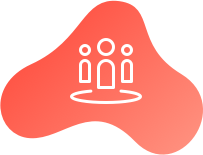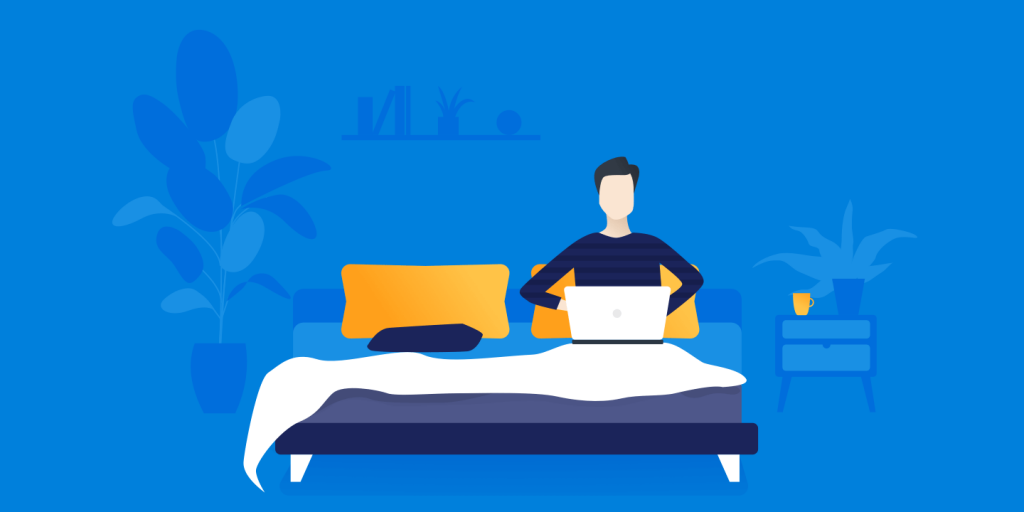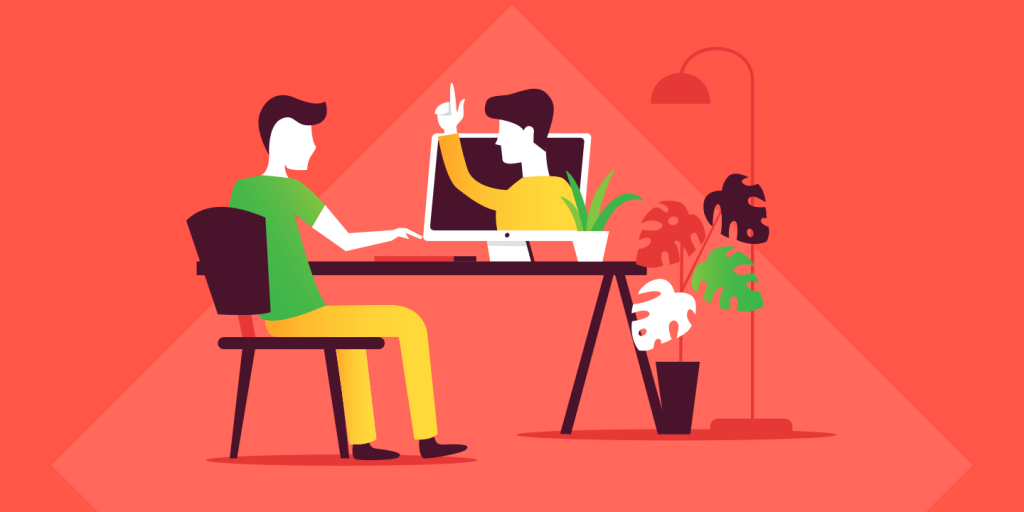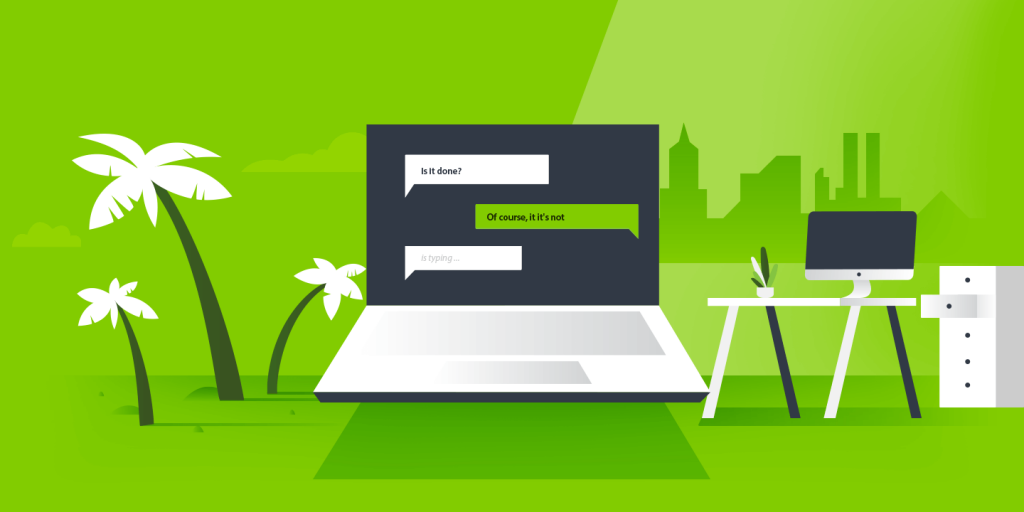Homus Distractus: the all-too-familiar feeling of being easily distracted when working from the comfort of your home.
Whether it’s kids asking for a snack, the pile of laundry staring at you from the floor or the gentle pull of Netflix… working from home comes with it’s own set of unique distractions. For me, my house is never cleaner than when I’m working against a deadline. For some reason, cleaning the bathroom is more appealing than facing down a hard task.
But with 70% of employees working remotely at least one day a week, we can all feel the need to get things done at home. In this article, 10 remote workers share their go to strategies for keeping on task, and we share five tools that you can use to level up your productivity at home.
 10 Strategies for Staying Productive and Avoiding Distractions When Working from Home
10 Strategies for Staying Productive and Avoiding Distractions When Working from Home
Peter from Feedly: When I really can’t get anything done, I go for a walk, run or just switch to something else for some time… usually a short walk helps a lot.
Alexis from Nylas: Sometimes I go do chores like tidying up the kitchen for a bit and then come back to things. It helps clear my head for some reason.
David Tiong from Tiong Creative: If I’m really struggling to be productive with staying on track, then I put my earbuds and shuffle my likes list on Soundcloud or Apple music. I find this works to block out the background distractions, and the familiarity of the songs helps to keep me focused on the work.
Mat from Help Scout: Sometimes, I will get on a train and write on my laptop or iPad while I travel, get off, grab lunch, and head right back again. It helps that it’s a coastal train line for the view (and quiet at that time of day), but it’s about breaking patterns for me.

Mat’s view from the train
Sarah from Olark: Timerrrrssss. The timer is your boss now. I set a timer to do chores, and it’s part of my work to evening transition.
Elizabeth from Automattic: I have a home office in a spare bedroom that I only use for work, and I only leave it at lunch and at the end of my workday. I “go to work,” my commute is just very short. I know it’s not possible for everyone to maintain a separate space, though — I couldn’t until recently. But if you can, it makes a huge difference. It also really helped me with not getting distracted by work in the evenings — I already left work.
Anne from Filestage: I found having a separate room that is my office is super helpful. If I work in the kitchen, I eat. If I work from bed, I end up on my phone.
Chelsea from RecruiterBox: I find I get distracted by home stuff for two reasons. One, I let the house get super messy and it’s bugging me (in that case, a speed clean can remove the distraction). Or two, there is something at work I don’t want to deal with, so I use home things as a distraction. (For example, yesterday morning I organized my junk drawer because I was stressed about a meeting).
Erica from GIPHY: When I’m distracted by something, I usually just deal with whatever it is that’s distracting me. I find I’m less distracted at home than in the office, so I justify that extra time to fix a distraction by telling myself it’s taking less time than if I was at an office being distracted by co-workers.
Luciana from Catarse: When I first started working remotely, I got distracted by anything, mostly because I hadn’t figured a good routine yet. But now that I have a pretty good routine set up, I find that when I’m procrastinating there is usually a specific reason for it. So, if I want to get out of distraction mode, I just take some time to really think about why I don’t feel like doing what I need to do and face the facts. It usually means I feel disconnected from the work, not on the same page about something, or just need to ask for help.
 Five Productivity Tools to Try
Five Productivity Tools to Try
Getting back on track by yourself can be tough. Using the four tools below in conjunction can create the perfect workflow to be productive. (Or not! Use what works for you!)
Pomodoro Tracker – setting timers can help you train your brain to focus for longer. The Pomodoro method suggests working steadily on one task for 25 minutes, then taking a five minute break.
Todoist – writing down your top priorities can help you structure your day and get back on task. Todoist is one of the best apps available because it works on multiple devices, integrates with other tools and provides location based reminders (pick up the milk while you’re at the grocery store!)
Focus App – if you find yourself wasting time on social media, browsing for knitting patterns or shopping for cat toys, you might need Focus App. It lets you block specific websites and apps that are your go to timewasters.
RescueTime – tracking where you spend your time is the first step to optimizing your workflow. Using RescueTime in conjunction with Focus App can help you identify additional sites that are wasting your time.
Self Care Checklist (You Feel Like S***) – make sure you’ve taken care of yourself today. If you aren’t hydrated, haven’t eaten or taken your medication, then you’re more likely to be distracted. This very helpful website walks you through your self care checklist so you can get back to taking over the world.
 Conclusion
Conclusion
Everyone has a different distraction that calls to them, and everyone has different strategies that work for keeping (or getting back) on task. If you’re finding yourself dealing with homus distractus, consider one of the following strategies:
- Set a timer – the pomodoro method works great to block off chunks of time to focus on work, or to complete a chore and return to work.
- Create a space dedicated to work – whether it’s your kitchen table or a dedicated home office, create a space that helps you focus.
- Change up your environment – put on familiar music or go somewhere else to work to jumpstart your brain.
- Deal with the distraction – clean up the mess that’s nagging your brain, or consider whether you’re actively trying to avoid a work task you don’t like.
But an important reminder – just like life shouldn’t distract you from work, your work shouldn’t distract you from your home life.
Alexis from Nylas reminded me that setting boundaries on your remote work is important too. While she doesn’t find herself getting frequently distracted from her work, she does need to make sure her work stays separate from her life. If you’re just starting to work remotely, make sure to set aside work at the end of the day and recharge – the ultimate strategy to stay productive and happy.











